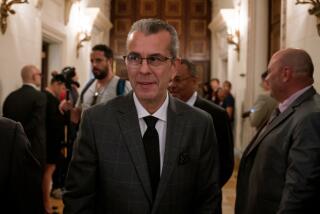Mexicoâs Ruling Party Falsified Vote, Helms Says
WASHINGTON â Sen. Jesse Helms (R-N.C.) charged at a Senate hearing Tuesday that Mexicoâs dominant political party, the Institutional Revolutionary Party, falsified returns in the 1982 election that brought President Miguel de la Madrid to power.
âThis is a scandal sufficient to impeach the legitimacy of the government,â Helms said.
He charged that the ruling party, commonly called PRI after its initials in Spanish, keeps âdouble booksâ on national elections, one a public accounting maintained by the official election commission and the other, with the actual results, by the Presidential General Staff.
The Mexican Embassy issued a statement dismissing the charge as âgroundless.â
Helms made his accusation in the third of a series of hearings conducted by a subcommittee on hemispheric affairs. Earlier, the subcommittee, which Helms heads, heard accusations of widespread corruption and drug trafficking in Mexico, charges that have led to strained relations between Washington and Mexico City and which have been partly retracted.
From the beginning, Helms has declared his opposition to financial aid for debt-ridden Mexico until political and economic reforms are carried out.
In the 1982 election, Helms said, the PRI was publicly credited with 68.7% of the vote while associated minor parties received about 2.5% of the vote. Six opposition parties, he said, were credited with 24.4% of the vote, he said.
But the âsecret results,â he said, showed that the PRI and its associates won only 39.8%, compared with the oppositionâs 55.1%.
Helms said the figures he cited were compiled by the Presidential General Staff, a body roughly equivalent to the National Security Council.
Helms had said he would release what he called top-secret documents obtained from Mexican sources after the hearing. But papers provided to the media were not copies of original Mexican documents but two pages of vote tallies typed by Helmsâ staff.
Helms also charged that last yearâs legislative elections were fraudulent, too.
Assertions âGroundlessâ
The Mexican Embassy said the Presidential General Staff âdoes not take any part in the electoral process.â Consequently, it said, âSen. Helmsâ assertion and the supposedly secret figures that he made public at todayâs hearing regarding recent election results are groundless and most probably are intended to confuse public opinion.
âThe counting of votes in any Mexican election is done by electoral officials, with the participation of representatives of all the political parties . . . in the election.â
John Gavin, the retiring U.S. ambassador to Mexico, was to have been the first witness at Tuesdayâs session, but Helms announced that the State Department has refused to allow Gavin to appear. The decision was reversed Monday night, too late for the ambassador to reach Washington from California, Helms said.
Gavin, who has been an outspoken critic of the Mexican government, was rescheduled to appear before the subcommittee next week.
Sol Sanders, author of a forthcoming book on the Mexican economy and one of four witnesses at Tuesdayâs session, described De la Madrid as âa president-emperor, with more relative power than any executive in the modern worldâ but unable to deal with the current economic crisis.
Sanders traced the crisis to the nationalization of banks by former President Jose Lopez Portillo in 1982, a decision that Lopez Portilloâs successor has been unable to reverse although he opposed it at the time.
âPersuading the Mexicans to move quickly toward dramatic reforms has to be the thrust of our policies,â Sanders said.
When Helms asked William D. Rogers, a former assistant secretary of state for inter-American affairs, for his opinion on U.S. policy, Rogers replied, âI can think of no worse place to hammer out policy than this hearing room.â
Attacks on the Mexican political system, âparticularly attacks on the honesty of the Mexican presidency,â are unlikely to win cooperation, Rogers said.
Rogers said he had visited Mexico City after an earlier subcommittee hearing, at which U.S. Customs Commissioner William C. von Raab alleged that the governor of the state of Sonora owned four ranches on which opium and marijuana were grown under military and police guard. âThe (resultant) demonstrations were extraordinary,â Rogers said.
Helms countered: âBut demonstrations are orchestrated by governments all over the world. Youâd be surprised at how much favorable mail Iâve received from Mexico.â
After Von Raabâs remarks, the Reagan Administration apologized, and the Treasury Department, of which the Customs Service is a part, issued a statement saying it had no evidence to support the charges about the Sonora governor.
More to Read
Get the L.A. Times Politics newsletter
Deeply reported insights into legislation, politics and policy from Sacramento, Washington and beyond. In your inbox three times per week.
You may occasionally receive promotional content from the Los Angeles Times.










